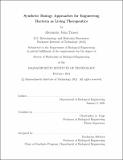Synthetic biology approaches for engineering bacteria as living therapeutics
Author(s)
Triassi, Alexander John.
Download1252627403-MIT.pdf (2.390Mb)
Other Contributors
Massachusetts Institute of Technology. Department of Biological Engineering.
Advisor
Christopher A. Voigt.
Terms of use
Metadata
Show full item recordAbstract
Bacteria and humans have a long-standing symbiotic relationship. As the details of their symbiosis continue to be elucidated, it has become clear that these host-resident bacteria are much more than spectators within the body. The ability of bacteria to manipulate human biology has inspired the notion that bacteria can be harnessed as "probiotics" to combat disease; in other words, as living therapeutics. Synthetic biology takes this concept one step further through genetically introducing novel functions into bacteria to provoke a targeted therapeutic effect in humans. However, none of the engineered living therapeutics that have progressed into clinical trials have been approved for therapeutic use. I pursued two approaches in an effort to reverse this trend. In my first approach, I developed a platform to overcome practical challenges of therapeutic strain design. This platform enables high protein expression levels from the genome of E. coli Nissle through the development of a genetic "landing pad" system and characterization of genetic regulators that can be controlled through the addition of chemical inducers. In my second approach, I developed a method for screening a diverse panel of bacteria for their ability to receive and express biosynthetic gene clusters encoding for antimicrobial peptides. After identifying bacteria that were capable of expressing these peptides, I explored their potential to prevent infection of the opportunistic pathogen Clostridium difficile and to serve as a bioproduction chassis of the C. difficile-targeting peptide. Together, this work outlines the development of a platform for creating the next-generation of living therapeutics and a unique method for engineering collections of bacteria to identify new chassis strains for heterologous protein expression.
Description
Thesis: Ph. D., Massachusetts Institute of Technology, Department of Biological Engineering, February, 2021 Cataloged from the official PDF version of thesis. Includes bibliographical references (pages 90-95).
Date issued
2021Department
Massachusetts Institute of Technology. Department of Biological EngineeringPublisher
Massachusetts Institute of Technology
Keywords
Biological Engineering.